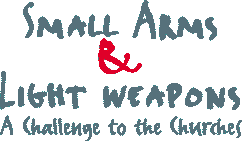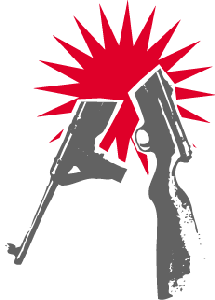
2001
UN conference on the illicit trade in small arms & light weapons in
all its aspects

The
need to act
Small arms and light weapons are an integral part of the spiraling culture
of violence in our world. Through war, crime, domestic violence and suicides,
more than 10,000 lives are lost each week to armed violence. The easy
availability of small arms and light weapons exacerbates and prolongs
armed conflicts, disrupts economic and social development, promotes crime
and a culture of violence, and produces an extraordinary worldwide burden
of cumulative personal tragedies and public crises.
It is a matter of urgent public responsibility that the international community now act to tackle the problems of the proliferation, accumulation and misuse of small arms and light weapons, and to address their debilitating social, economic, political and humanitarian impacts.
A
first attempt by governments
From July 9-20, 2001 the United Nations Conference on the Illicit Trade
in Small Arms and Light Weapons in All Its Aspects took place in New York.
It was the first gathering of the world's governments to address the issue.
It also provided an important opportunity for states and civil society to
highlight the humanitarian toll of small arms and light weapons. Ultimately,
delegates reached a final consensus agreement on a Programme
of Action to Prevent, Combat and Eradicate the Illicit Trade in Small Arms
and Light Weapons in All Its Aspects (UN PoA.doc) after two weeks of
difficult negotiations. However many governments and NGOs were disappointed
that critical elements needed for the solution of the problem were either
not included in the Programme or were watered down to the point of irrelevance.
These included in particular:
|
Despite these failings, the conference can be deemed a success for the mere fact that it occurred at all. High-level international attention was given to the issue, states were forced to go on record with their views of the causes and consequences of the problem, and NGOs and civil society, within umbrella organizations such as the International Action Network on Small Arms (IANSA), came together and formed partnerships that will surely be critical for future deliberations on the matter. The role of the churches Together with IANSA, the WCC Commission of the Churches on International Affairs played an active role in the UN Conference and sent a delegation to be present at the meetings themselves in New York, adding an ecumenical voice to the international arena with stories of hope and pain. As we embark on a Decade to Overcome Violence (2001-2010), the WCC calls on the churches "to emphasize their readiness to live without the protection of armaments;" (Fifth WCC Assembly, Nairobi 1975) and do those things that make for peace with justice. |
Related
Press Releases Disappointed at small arms agreement, WCC also sees hope for a stronger platform for common action Wait for the homework, Mozambican Bishop tells NGOs Oral intervention on reduction of demand for small arms and the role of faith communities Churches use story, symbol and dance to protest the use of and trade in small arms
Back
to main Peacebuilding and Disarmament page |